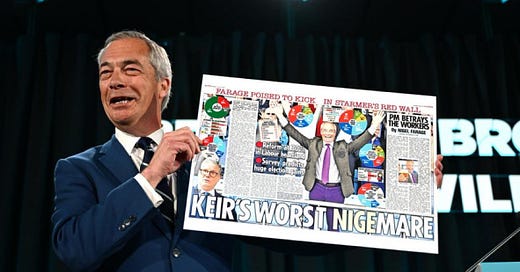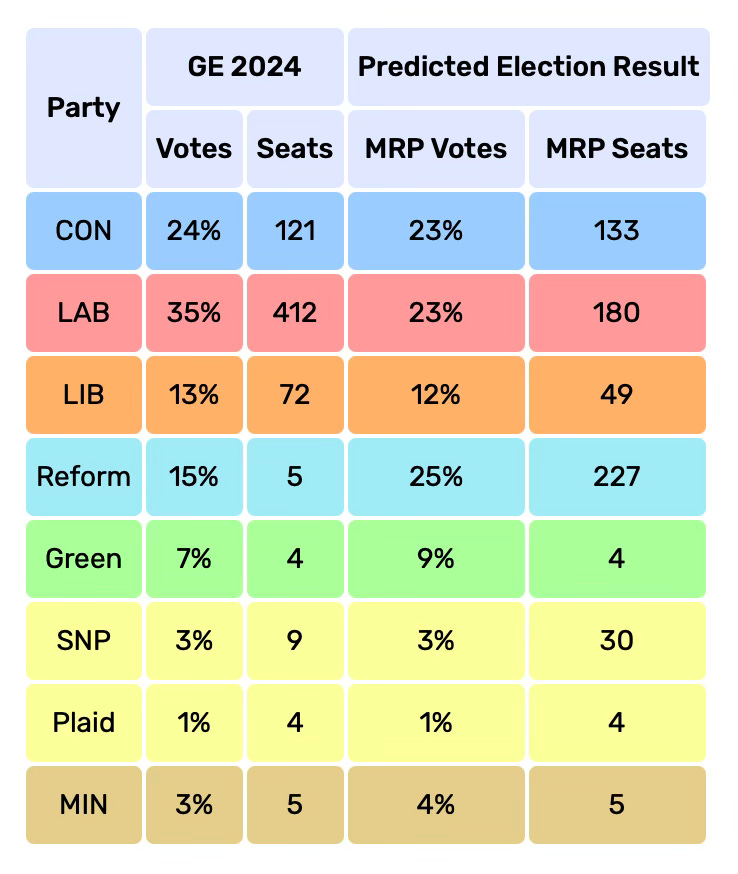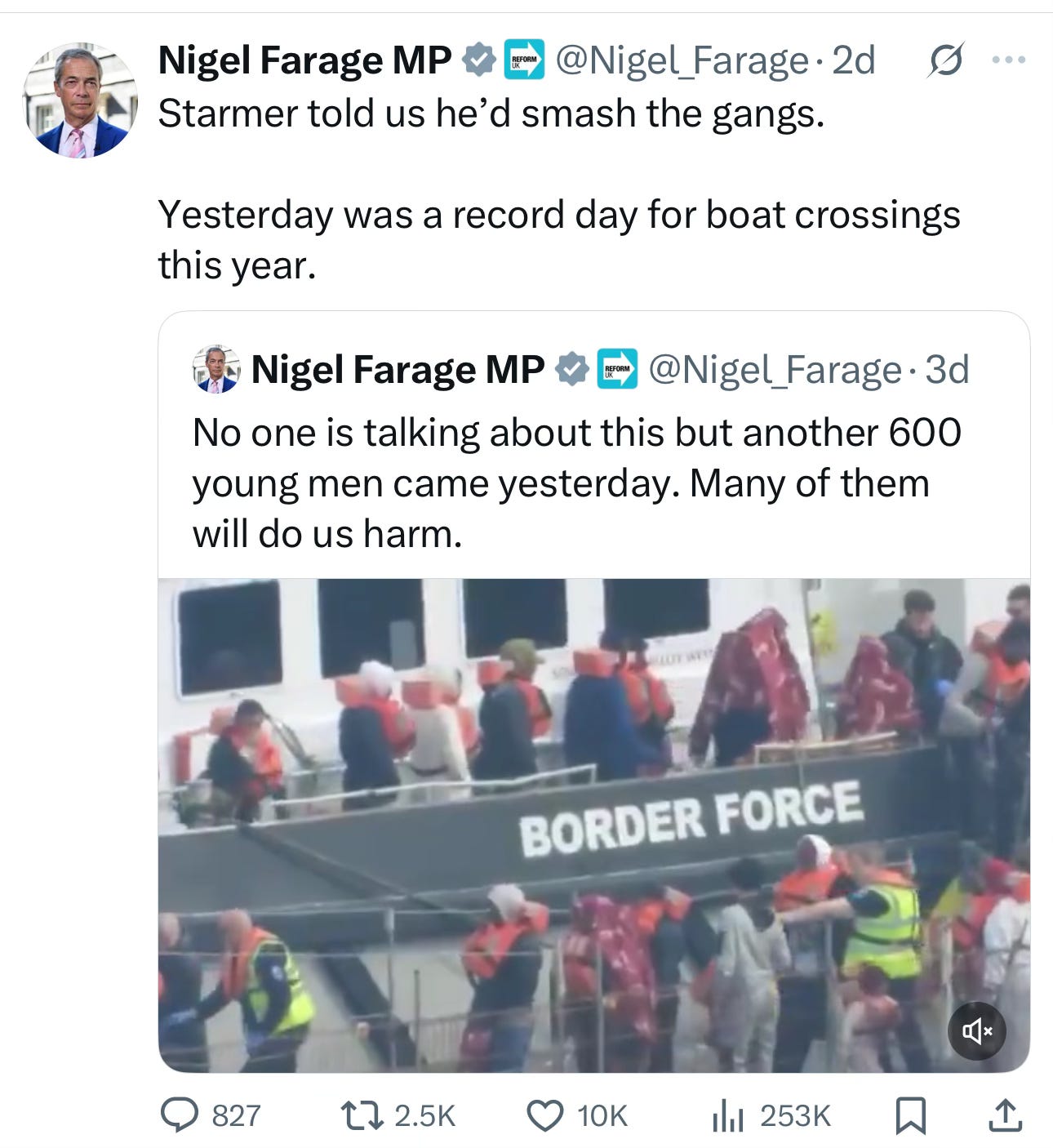If a general election were held today, Nigel Farage would be on course to become Prime Minister.
That’s the extraordinary projection from Electoral Calculus, which now places Reform UK as the largest party in Westminster with 227 seats, ahead of Labour on 180 and the Conservatives on 133 (MRP Poll, April 2025.) The most likely outcome? A Reform–Conservative coalition government, led by Farage, with a 70-seat majority.
This isn’t a protest vote or a one-off spike. It’s a political catastrophe in slow motion, made possible not just by the Conservative Party’s collapse, but by Labour’s profound failure to offer an alternative.
Keir Starmer walked into Downing Street last July with a historic mandate and a broken country crying out for change. Nine months later, the only change visible is in the polls - and not in Labour’s favour.
They Won the Election and Chose Timidity
Starmer’s Labour inherited a nation ravaged by austerity, Brexit, and 14 years of Conservative chaos. The moment demanded boldness. Urgency. A plan for national repair.
Instead, the public got fiscal conservatism dressed up as responsibility, a shredded manifesto, and a government that acts like it’s still nervously shadowing the Tories from opposition benches.
In ‘Austerity Everlasting: Labour’s Cowardice Presides over Britain’s Decay’ we warned that Starmer’s refusal to break with the economic consensus would backfire. We are now living that reality. A government that won’t touch wealth, won’t challenge power, and won’t even pretend to offer structural change is not governing. It is just managing the decline.
And into that void steps Farage.
Farage Doesn’t Need to Win the Argument; Labour is Losing it for Him
It’s tempting to view Reform’s rise as a sudden phenomenon. But this has been years in the making, and Labour have been complicit. In the Red Wall, in coastal towns, in communities gutted by deindustrialisation and neglect, Farage doesn’t have to show up. Labour is campaigning for him, by failing to offer anything better.
Just like in the 2024 election, voters aren’t necessarily voting for Reform. They’re voting against Labour. Against disappointment. Against the sense that nothing changes and no one listens. Farage, ever the opportunist, doesn’t need to be in Clacton; he’s in Mar-a-Lago with Trump, importing conspiracy, grievance, and rage from the new heart of reactionary power.
Labour, meanwhile, remain silent, cautious, and managerial. And the public sees it.
Border Chaos and the Return of the Boats
Nowhere is Labour’s failure starker than on the question of small boat crossings.
In opposition, Starmer was vocal in his condemnation of the Tories’ Rwanda policy. He called it, “such utterly pathetic nonsense” (Scott, 2024.) But in government, Labour has offered little clarity on what it would do differently. The party’s ‘Border Control’ plan was always vague, light on detail, heavy on posturing.
The result? The crossings continue. Desperate people are still dying in the Channel. And the far right is feeding off every image, every arrival, every absence of leadership.
Farage points to Labour’s silence and calls it weakness, and he’s not wrong. Not because he offers answers, but because Labour doesn’t.
Labour promised control. What it delivered was drift. It neither created safe routes nor stopped the boats. It surrendered the narrative entirely, letting Farage define the terms of debate. He didn’t need to win the argument; Labour lost it for him.
The Vacuum of Belief
The central problem isn’t tactical. It’s existential.
Labour no longer believes in transformation. It believes in appeasement. It won power with a pledge to be safe, sensible, grown-up, a steady hand on a burning wheel. But the country wasn’t asking for stewardship. It was begging for rescue.
In ‘Keir Starmer’s Austerity Betrayal: Labour’s Lost Soul?,’ we laid out how Starmer shredded the promises he made to the party and to the public: no public ownership, no wealth tax, no bold investment. The betrayal wasn’t just political - it was moral. The Labour Party once offered hope. Now it offers spreadsheets and silence.
Voters feel it. They feel the hollowness, the managerial detachment, the lack of urgency. And when no one offers hope, anger finds a home. Farage is not trusted, and he doesn’t have to be. His power lies in Labour’s hollowness, and in the growing belief that no one else will ever change anything.
This Is How Democracy Unravels
Farage’s ascent is not a fluke. It is the direct result of Labour’s abdication of political responsibility. Starmer has governed like a party afraid of its own power. He won the election, but he’s governing more like he’s leading a party three terms in who have run out of ideas. It’s as if they’re just waiting for the next party to have their turn. It has become a cliché, but one can’t help but think of people straightening chairs on The Titanic as the ship sinks.
Labour has power. But power unused is power wasted, and that vacuum is now being filled by a man who cheers on American insurrectionists, flirts with fascist narratives, and treats parliamentary democracy as a stepping stone for personal brand-building.
Electoral Calculus is not merely warning us about a swing. It is showing us what happens when liberal parties forget how to fight; when they forget who they’re supposed to fight for.
This could have been Labour’s moment. Instead, it may become Farage’s. If Labour doesn’t change course – fast - then the man who has never stayed long in Parliament, never cared for his constituents, and never taken responsibility for anything, may well find himself behind the black door of No. 10.
Not because he earned it. But because Labour left it open.
Notes From Plague Island is quickly becoming a full-time venture. We want to grow our output and dedicate more time to writing, but it takes support! If you enjoy our work and can help, please support us on ‘Buy Me a Coffee.’ Every coffee helps, in many ways. Thank-you - we appreciate you!
https://buymeacoffee.com/notesfromplagueisland
References
MRP Poll, April 2025. Electoral Calculus. Available at: https://www.electoralcalculus.co.uk/blogs/ec_vipoll_20250404.html [Accessed 16 April 2025]
Scott, J. ‘Rwanda bill: Keir Starmer attacks Tory ‘farce’ – as Rishi Sunak insists the small boats plan ‘will work.’ Sky News, (17 January 2024.) Available at: https://news.sky.com/story/sir-keir-starmer-attacks-tory-farce-over-rwanda-bill-as-rishi-sunak-insists-the-small-boats-plan-will-work-13050187 [Accessed 16 April 2025]






